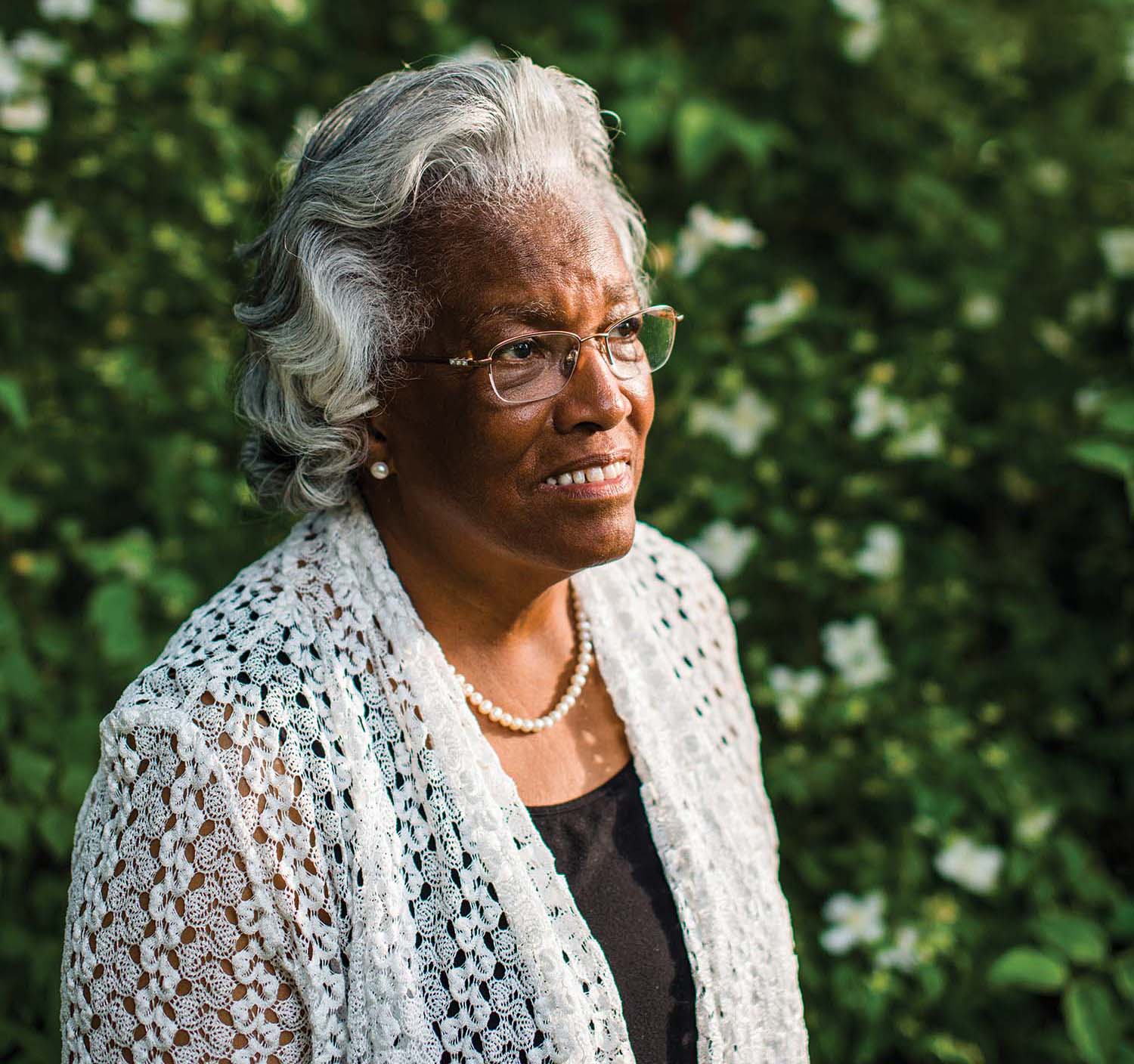
Pearlie Mae Suber Harris, a grandmother of two based in Mauldin, SC, left Saluda to find work in Greenville in the early ’50s. When she was growing up, “nothing was ever thought or said about civil rights,” she remembers. Photo by Karin Strickland
When Pearlie Mae Suber Harris was growing up in Saluda’s small, strong African-American community in the 1930s and 1940s, certain rules were in place when she and her siblings ventured downtown. “As small as Saluda was, we were sometimes afraid to walk on the sidewalk because we had been told to move several times,” Harris remembers of those Jim Crow-era days. “You always had the best of manners — ‘Yes ma’am, no ma’am’ — and the same with addressing men, all of these [white] people, with ‘Mrs.’ or ‘Mr.’”
Harris, who turned 82 this spring, will be the featured guest of the Historic Saluda Committee this month for a discussion of life in the town well before the passage of the landmark Civil Rights Act of 1964. Harris, who left Saluda in 1953 to find work in Greenville, South Carolina, where she now lives, often returns to her hometown to talk with elementary-school students about what it was like at their age when Saluda, despite its small population, was as immured in institutional segregation as most everywhere.

Church leader Rev. Lester Suber presiding over outdoor baptisms in Saluda. (Photo used courtesy of Pearlie Mae Suber Harris)
But it was because of the town’s size that the lines may have seemed less firmly drawn than in bigger places, especially since Harris’s father, the Reverend Lester Suber, a Baptist minister, was a well-respected figure in town who had brought his family to Saluda from Flat Rock when Harris was still a toddler. Rev. Suber preached at St. Matthews Church and elsewhere in the area. A growing African-American population in the 1940s and ’50s, partly due to railroad work on the notoriously steep Saluda Grade, gave rise to a thriving gospel scene in which Rev. Suber was a key leader. Phoebe Sullivan was a local faith healer whose services were sought by both the black and white communities and whose reputation eventually spread to national renown. She founded the Sullivan Temple Missionary Baptist Church, where she hosted many of the genre’s stars that came through Saluda.“This is how we met Mahalia Jackson, The Five Blind Boys, and many more groups,” notes Harris.
She also remembers that “The Pace and Ward store owners were always good to us because my father had an excellent reputation with all the people in town.” One time, she decided to pass out crackers to customers from the shelves at Ward’s grocery store (now called Historic Thompson’s Store/Ward’s Grill, it is the oldest still-operating grocery in the state). She had to repay 20 cents to Mrs. Ward with, she remembers, no hard feelings. “We all still stopped in her store to get warm as we walked to school in the cold winter days.”

Photo used courtesy of Pearlie Mae Suber Harris
But school for Harris and other African-American children only went through the ninth grade. The classes were held in a house overlooking Route 176 and downtown that her parents later bought as a family home. (The building was destroyed by fire several years ago.) “Daddy had to make a decision, whether we were going to [high] school in Tryon or in Hendersonville” — the only two options for local black students. Hendersonville was chosen because it was an easier, less curve-plagued route than winding down the mountain to Tryon. As Harris’s family had no car, a temporary solution was to cram Pearlie and six other students into an old Ford that was the only available transportation owned by a nearby family. “We did that for one school year and it was terrible,” Harris says. “The next year we rode the Trailways bus. It picked us up in the morning at 6:30 and returned us home late in the afternoons, at 4:30. We walked from the bus station in Hendersonville to school.”
When she left Saluda for Greenville, the civil-rights movement was just beginning to stir to organized life, not yet penetrating to smaller communities. There was certainly discrimination in her mountain hometown, but it felt more frightening in the relatively large Upstate city. “Nothing was ever thought or said about civil rights,” Harris reflects. “When I left Saluda in the early ’50s, African-Americans were still called ‘colored’ people. It would take a while to tell you all the other adjectives that were used to describe us — mean names that we were called … [we] were never allowed to talk back or mention it to anyone except Mom and Dad.”
She worked and lived for a time for a Greenville family before beginning her college education, eventually becoming an elementary-school teacher and earning a Master’s degree from Furman University. When giving talks today, Harris returns to an outwardly different mountain town since the days of stepping off the sidewalk to allow whites to pass. “It’s really a sweet, cozy place to visit,” she says. “I always feel proud of the accomplishments I have made coming from so little and having the shoulders of so many holding me up. I’m proud to say I am Blandena and Reverend Lester Suber’s daughter and grew up in Saluda, North Carolina.”
The Historic Saluda Committee’s “Step Back in History” series features a meet-and-greet with Pearlie Mae Suber Harris at 10am on Saturday, June 9, at the Saluda Senior Center (64 Greenville St.). Free. For more information, call 828-749-2581, e-mail cindystuttle@gmail.com, or see historicsaluda.org.

Dear Pearlie,
Thank you for sharing some of your past with us. I enjoyed reading about your
life growing up in Saluda, one of our favorite small towns. You are an inspiration to so many of us and I know that your Mom & Dad would be so proud of the beautiful woman that you are. Love you,
Elaine & Richard